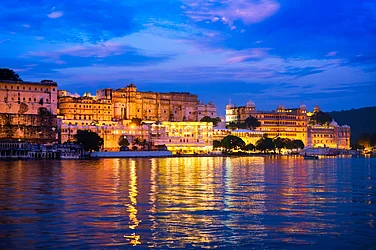Once a quiet junction nestled between Mumbai and Pune, Chowk-Karjat is undergoing a transformation that’s both strategic and soulful. What was once a weekend escape for trekkers and nature lovers is now emerging as Maharashtra’s most promising eco-luxury corridor a place where curated hospitality meets aspirational living. With branded resorts, boutique retreats, and experiential destinations mushrooming across the region, Karjat is no longer just a getaway. It’s becoming a lifestyle.
From Rustic Retreat to Refined Destination
The hospitality landscape in Karjat has evolved dramatically over the past five years. Leading the charge is Radisson Blu Plaza Resort, a global brand that has anchored Karjat’s premium positioning. With over 100 rooms, spa suites, and expansive banquet spaces, Radisson Blu caters to both leisure travelers and corporate offsites. According to industry trackers, weekend occupancy rates consistently exceed 85%, a figure that rivals top-tier destinations like Lonavala and Alibaug.
Boutique properties like Forest Club Resort and U Rivergate Karjat have added depth to the region’s hospitality offering. Forest Club’s infinity pool overlooking the Sahyadris and U Rivergate’s riverside yoga decks offer immersive experiences that blend luxury with nature. Operators report a 40% year-on-year increase in weekend bookings, driven by wellness seekers, urban creatives, and hybrid-working professionals.
Infrastructure Catalysts
Karjat’s rise is not just organic it’s being accelerated by transformative infrastructure. The Atal Setu (Mumbai Trans Harbour Link) has drastically reduced travel time from South Mumbai, while the expansion of JNPT (Jawaharlal Nehru Port Trust) and the upcoming NMIA (Navi Mumbai International Airport) are enhancing regional connectivity. These developments are making Karjat more accessible to both domestic and international travelers, catalyzing hospitality growth and second-home investments.
Culinary & Cultural Anchors
No conversation about Karjat’s hospitality boom is complete without mentioning Oleander Farms and its flagship restaurant, Saltt. This farm-to-table fine-dining destination has become a cultural anchor, drawing over 2000+ visitors monthly from Mumbai’s elite. With artisanal cocktails, jazz evenings, and seasonal vineyard brunches, Saltt has elevated Karjat’s culinary credibility.
“Saltt isn’t just a restaurant it’s a lifestyle statement. It’s where nature, design, and culture converge.” — Hindustan Times, Genesis Feature on Chowk-Karjat
Renowned developers are also shaping Karjat’s future with large-scale community projects that integrate hospitality, lifestyle, and residential living. Among them, Arihant Superstructures Ltd stands out with its ambitious plans for World Villas — a flagship residential development that includes Club10 Gymkhana featuring eight marquee restaurants across 10 acres, and a 225-room five-star hotel on 9 acres in partnership with a branded hotel chain. These integrated offerings are expected to significantly boost hospitality infrastructure and attract high-net-worth individuals (HNIs), further increasing footfalls in the region.
Other curated spaces like Common House, Deewan Khana, and SaffronStays Villas offer private villa stays, art residencies, and community programming. SaffronStays’ partnership with Forest By The Hills has delivered immersive eco-luxury retreats that sold out within weeks of launch, a testament to the region’s rising desirability.
Footfalls, Growth & Market Momentum
The numbers tell a compelling story. According to local tourism boards and hospitality trackers:
Visitor footfalls have surged from 800,000 in 2022 to over 1.2 million in 2024 — a 50% increase in just two years.
Second-home market growth has exceeded 30% year-on-year since 2020, fueled by post-pandemic lifestyle shifts and improved connectivity.
Land appreciation in premium pockets has jumped from ₹25/sq ft in 2014 to ₹300/sq ft in 2024 — a tenfold increase.
Hospitality-led uplift: Land parcels adjacent to resorts and boutique stays have seen a 25–30% value increase over the past 3–5 years.
Destination weddings have emerged as a key growth driver, with over 300 high-value events hosted in 2024 alone, contributing to a 20% rise in seasonal bookings.
Corporate offsites and MICE (Meetings, Incentives, Conferences, Exhibitions) have grown by 35% year-on-year, with resorts reporting full bookings during peak quarters.
Air Quality Index (AQI) in Karjat averages between 35–50, significantly lower than Mumbai’s 150+, making it a preferred wellness and retreat destination.
“The Atal Setu and JNPT–Chowk Highway have redefined accessibility. Karjat is now a serious contender for first-home living.” — Genesis Report, Hindustan Times
Hospitality as a Strategic Signal
The hospitality boom isn’t just about more rooms — it’s a signal of deeper transformation. Global brands and boutique operators validate Karjat’s long-term upside, attracting institutional capital and high-net-worth investors. NRIs, founders, and wellness entrepreneurs are converting weekend retreats into permanent homes, drawn by curated experiences and nature-first living.
“Karjat is no longer just a weekend escape, it’s a lifestyle upgrade. The demand for curated hospitality experiences here is unprecedented.” — Prahlad Kakar, Promoter, Forest By The Hills
Emotional Resonance
Where luxury whispers through the trees, and every sunrise feels like an invitation to live a story worth telling Karjat’s hospitality boom is not just changing the skyline, it’s reshaping identity.
Closing Thought
Chowk-Karjat isn’t waiting for the future it’s building it. For investors seeking sustainable appreciation, and families craving everyday luxury amidst nature, Karjat is the next big frontier. The hospitality boom is just the beginning.






















